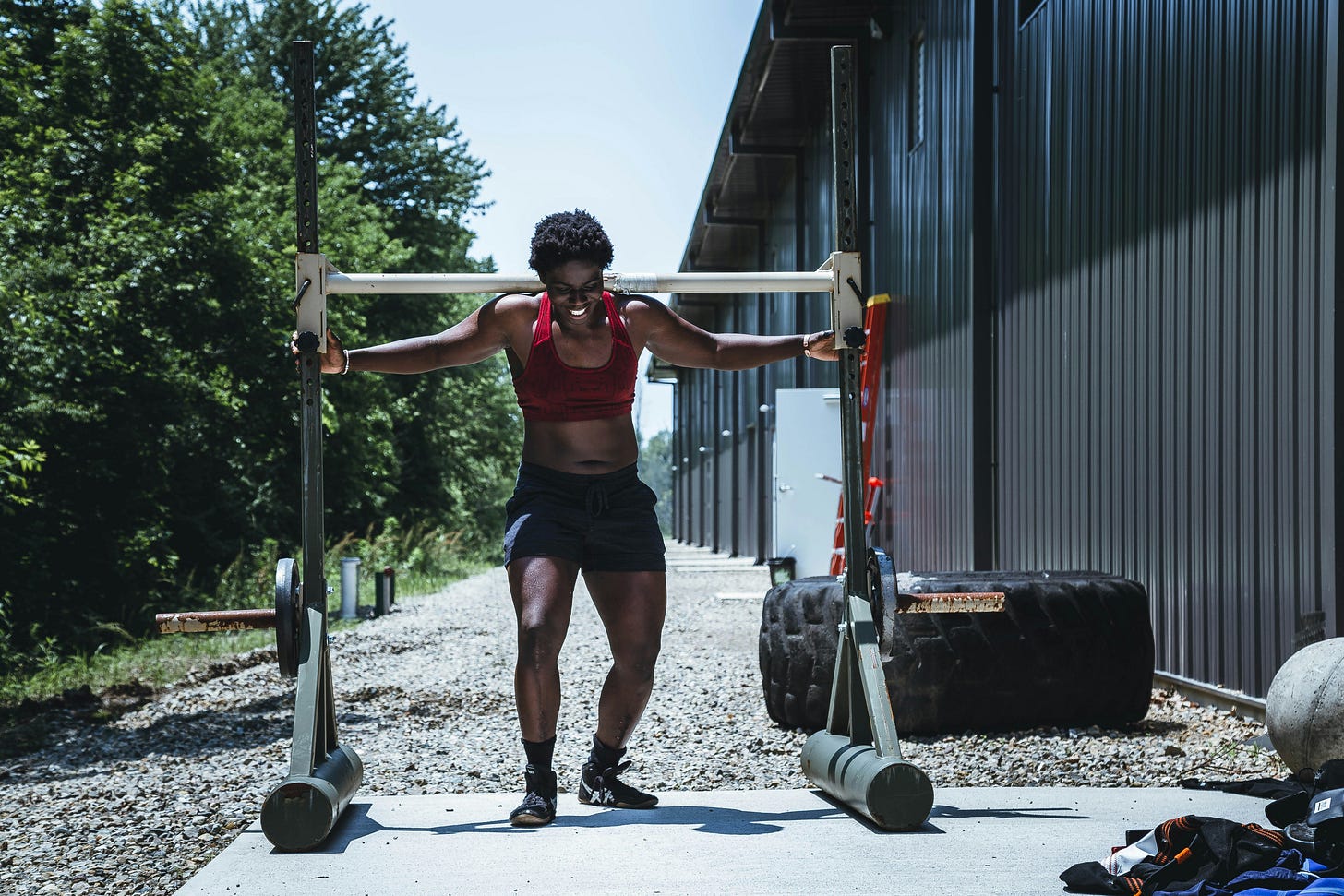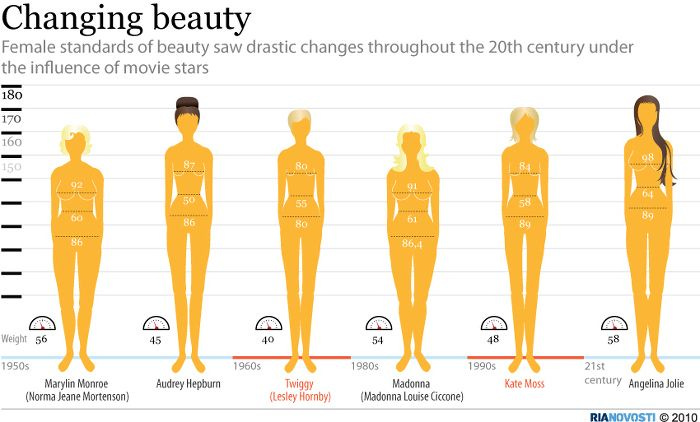Lift like a Women who Can Fight a Bear in the Forest: Six Reasons Strength Training Will Change your Life
What if the strongest thing a woman could do wasn’t shrink, but lift?

Two years ago I stumbled on a video by Meg Boggs that lit the spark. A plus-size fitness influencer, Meg was lifting heavy to a voiceover that’s stayed with me ever since:
“I don’t want to be strong like a man who looks pretty. I want to be strong like a bitch who fights bears in the forest.”
I sent it to every woman I know. Something about it struck me deeply. I was floored and astounded by the beauty of seeing a woman own her body and living in it wholeheartedly. Her strength was in both the doing, and the undoing, of society's expectations of what strength should look like.
Meg’s power wasn’t just in the weight she moved, but rather in the way she dismantled the story we’ve been told about what strength should look like.
The truth is, I don’t want to need help opening a jar. I want to crush it in the palm of my hand.
I don’t want to wait for someone to carry my suitcase up the stairs of the London tube. I want to throw that thing over my shoulder and sprint.
I don’t want to be strong to be pretty.
I want to be the kind of strong that scares the shit out of the bear (and maybe a few men too).
Historical Trends in Fitness and Beauty Ideals
For generations, women have been told to shrink physically, emotionally, and socially. To look pretty. To let men be strong. While the ideal size and shape of a beautiful female body has changed over time, ultimately the goal is that women should remain small, and desirable to, and for men.
The gym, especially the weight room, was a space coded as masculine, a domain of bulging biceps and testosterone-fueled grunts. Yes, the stench of pubescent boys and sad, masculinity overwhelms the senses. But it is also the anxiety-inducing feeling that threatens one's sense of personhood and tells you that you do not belong here.
The history of fitness is riddled with rules about what women’s bodies should do and how they should look when doing it. Women have been handed yoga mats and cardio machines while the weight room sat behind an invisible velvet rope of intimidation.
Weightlifting? Too masculine. Too risky. Too… much. For decades, the default advice was smaller, softer, lighter. Women’s sports were built around grace and control. Activities that built visible power were dismissed or worse, pathologized.
It’s not just about gyms. It’s about a culture that taught us our power should be quiet, internal and decorative. Not explosive or heavy or breaking a sweat in the squat rack.
Ultimately we were relegated to the periphery, encouraged to pursue activities that promised a lean, toned physique. Activities that keep us small, and controllable without the "risk" of bulk- or the power to fight back? Strength was seen as unfeminine.
But that story is changing.
Meg, and the many women who own the weight room, are unapologetically crushing these stereotypes. Tracking weights, not their weight.
The goal of fitness and exercise is no longer just about aesthetics, appealing to men, or appeasing normative stereotypes around beauty norms that very few of us will ever live up to.
This is about strength: literal, emotional, and cellular. It’s about rewriting scripts that never served us, and choosing something far more powerful in their place.
The Cultural Shift to Strong

Today, we’re witnessing a cultural awakening. A quiet revolution in motion. Over the past 10 years or so, we have seen women turning to strength training and lifting to not just shape their bodies, but to reclaim them. It’s not about aesthetics alone. It’s about power, ownership, and the radical act of prioritizing our own wellbeing in ways we were never taught to.
The rise of strength training marks a sharp break from the old story. The one that said our worth increased the smaller we became. Now, we’re flipping the script. Gaining strength (and consequently weight) is an act of self-worth. Of value. Gold is measured in pounds, is it not?
There’s a different kind of confidence that comes from lifting, one that doesn’t shrink or contort. It expands. It lingers. It follows you out of the gym and into the rest of your life.
This isn’t just a workout trend but movement. And in that a refusal to be confined by outdated ideas of what strength looks like, or who gets to claim it. It’s about taking up space- unapologetically, physically, emotionally, and metaphorically.
Because strength isn’t just about muscle. It is about resilience, confidence, and the kind of power no one can take from you.
Science Says its So

Now, I could ramble on lyrically about how lifting changed my life because it did. I’ve built a foundation (dare I say, core) that’s helped me manage my herniated discs and move through life with more ease and less pain.
I feel more confident walking the streets. Not that I could literally fight a bear but maybe I’d have a fighting chance.
I feel secure in myself in a way that’s irrevocable. I take up space in a strong body. A thick body. A body that can lift heavy things and do hard things.
For me, strength training has been an act of defiance. My quiet feminist rebellion against a system that wanted me small, compliant, and unsure of my own strength.
And all of that aside? The benefits of strength training for women are profound, well-documented, and rooted in science. This isn’t just "the vibe" or next fad. It’s evidence-backed.
Six Reasons why You Should Strength, Weight and/or Resistance Train
Improved bone health: I never used to think about bones until I watched the women in my family begin to shrink. Not metaphorically but yhysically. Spines curved, steps slowed, strength softened over time. It was subtle at first, then obvious. For my peri-menopausal and menopausal friends, this is where strength training becomes more than just a fitness choice- it’s a health imperative. As estrogen dips, so do muscle mass and bone density. That isnot fear-mongering; it is biology. But what we do about it? That’s power. Lifting weights can counteract both muscle loss and bone weakening, helping to preserve the structure and strength of your body as it changes. Regular resistance training has been shown to increase bone density and reduce the risk of osteoporosis especially post-menopause (PubMed, 2016; Medicine & Science in Sports & Exercise, 2025).
Metabolic boost: I like food and I like feeling strong. Want to eat more? Lift heavy. Research shows that muscle increases resting metabolic rate, supporting healthy weight maintenance without restriction (ScienceDirect, 2024). Who really wants to be a skinny, hungry bitch when you can be a strong, full one.
Mental well-being: There are days I walk into the gym feeling like everything’s slightly off-kilter and leave with the buzz of endorphins humming in my ears. Not every lift is transcendent, but most of them help. Strength training has been shown to significantly reduce symptoms of depression and anxiety, likely due to both biochemical changes (endorphins, dopamine) and psychological ones (mastery, routine, progress) (NPR, 2024). When your body feels capable, well your brain believes it too.
Functional Independence: I’m the girl who walks into doors. I have a constellation of bruises on my shins and arms at all times. Coordination has never been my thing but since lifting, I notice I catch myself before I fall more often. I feel more stable. Less thrown. And it's not just me. Strength training improves muscle power, balance, and coordination, making it easier to complete daily tasks and reducing the risk of falls, especially as we age (Front Public Health, 2023).
Hormonal Balance: Trying to navigate menstrual or perimenopausal symptoms? It turns out lifting can help balance your hormones and ease the rollercoaster of the female endocrine system. Science suggests that regular strength training supports hormonal health by helping regulate insulin, cortisol, and even sex hormones - all of which play a role in potentially managing mood, energy, and menstrual and perimenopausal symptoms (J Clin Medicine, 2023; Journal of Bodywork and Movement Therapies, 2023)
Chronic Disease Prevention: There’s a quiet kind of comfort in knowing that every rep is a deposit in a long-term health bank. I can't really afford private healthcare and the NHS is well…don't get me started. I think about future me and how I want her to move through life: strong, autonomous, and protected. Regular resistance training reduces the risk of chronic diseases including type 2 diabetes, cardiovascular disease, and even some forms of cancer by improving insulin sensitivity, reducing inflammation, and supporting overall metabolic function (ScienceDirect, 2024; NPR, 2024). Strength isn’t just about what you can lift. It’s about what you can prevent.
Lift like a Girl: Feel like a Boss
Caption: Nothing like the feeling of getting a PB lifting. Top tip: Start lifting because every lift is a PB in the beginning
I know it sounds a little tacky, a little bougie. But honestly? It’s true.
There’s a moment when lifting flips the switch. When you walk into the weights section and realize you own that room. When the bar moves, that one that wouldn’t budge two weeks ago, and you feel that surge of something electric. A new PB, a win on your own terms. Not because your body got smaller. But because you got stronger. You claimed something. You changed something.
It’s not just the lift. It’s what rises in you when you do. It's about what you are lifting up- you.
This journey isn’t about fearlessness but familiarity. Getting closer to your power: to test it, trust it. And you know what? Ultimately realizing it was yours all along.
For too long, we have been told our dream body was the smallest possible version of ourselves. That thinness meant happiness. That shrinking was the goal. But we know better now. Smaller doesn’t mean better. It doesn’t mean confident. It doesn’t mean free.
You don’t have to live your life orbiting around weight loss. You don’t have to make being “less” your legacy. You get to want something else - something more.
Because lifting and strength training offers that. It’s not just about muscle. It’s a new narrative. One where strength doesn’t make you less feminine, but more you.
One where taking up space is not a problem, but a practice.
This time, we are not chasing thin. We are chasing strong.
This time, we are not disappearing. We are arriving.
xo
****Call to Action****
If you like this, and/or my other posts please don’t forget to like the post (tap that heart), and share with a friend. Yes, I know I sound like an influencer- it’s the algorithm people!






I might try
I might try